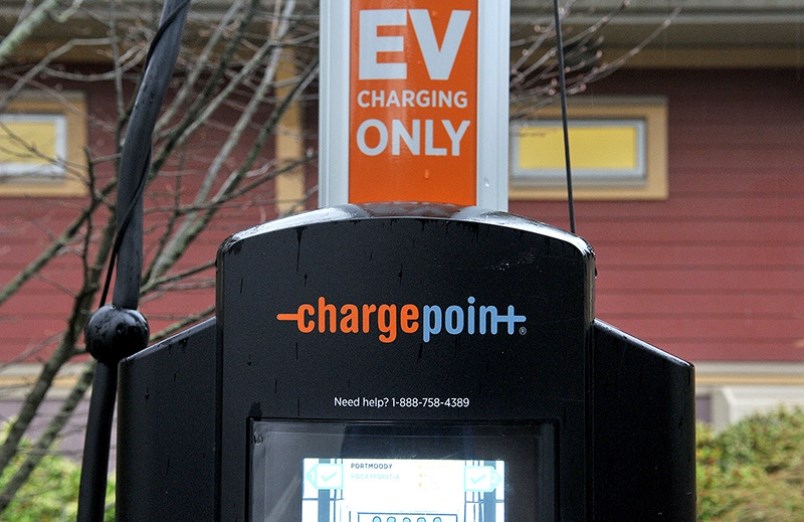Coquitlam will install a user-pay electric vehicle charging station at the Poirier Sport and Leisure Complex this summer, but some city councillors say the municipality should bump up the recommended fee it will charge.
On Monday (Jan. 14), council approved the charging station — which will be located between the complex and the Poirier branch of Coquitlam library — along with dedicating the only one it currently has at city hall to public use, and the installation of four more at a lower level for the city’s EV fleet.
Staff recommended the city impose a $1 per hour fee for using the public chargers and a maximum of two hour parking restriction for the spots.
Jozsef Dioszeghy, Coquitlam’s general manager of engineering and public works, said the staff looked at several options and talked to some EV owners and determined it was unlikely anything over a dollar would attract usage because it only costs about 80 cents an hour for residents to recharge. They’d rather park in the free stalls than pay to charge, he said.
“Even at one dollar per hour, they’re not interested in it,” said Dioszeghy. “The assumption was that they would only use them to charge if they were desperate otherwise they will charge at home.
“If people were not even willing to pay a dollar an hour we couldn’t even think of charging $2.”
Coun. Bonita Zarrillo, however, said the city should start by charging $2 an hour because it is a convenience fee. Council, though, won’t decide what to charge for charging until an amendment to its fees and charges bylaw is brought forward.
“Gas stations aren’t public infrastructure and, while this is a different model, as long as we’re able to charge for these parking spots we need to charge a little bit more aggressively than we are now,” said Coun. Chris Wilson.
A report to council notes Lower Mainland municipalities operate 165 public charging stations. Level 2 stations are the most common, but there are some Level 3 fast-charge stations. Most are at major recreation and cultural centres and city halls. According to the report, New Westminster has 24 free public charging stations, while Port Moody has 12.
Wilson added that the Coquitlam should be looking at acquiring more charging stations overall.
“I find it just a little bit embarrassing that Coquitlam has just one,” he said. “I know we’re going up to three or four and I’m sure a lot of these cities got grants to do a lot of charging stations, but a city like Port Moody with 12 Level 2 charging stations, I’m sure they didn’t get grants for all 12 charging stations.”
“We ought to have more now that we have calculated the rate to pay for it,” said Mayor Richard Stewart.
Coun. Craig Hodge, who like Stewart owns an electric vehicle, said he’s concerned EV owners who reside in older multi-family dwellings in the city centre that don’t have charging outlets will monopolize them. But Coun. Brent Asmundson said it should be BC Hydro’s role to find places to install them or offer incentives for their installation.
“I do not think it is our responsibility to provide them for people who may not have them in their building,” said Asmundson.
Each charging station is capable of charging two vehicles simultaneously. The existing public charger at city hall, which is shared between the public and the city’s EV fleet, had 2,100 free charging sessions logged in the last year.
The public installations, to be done this summer, are estimated to cost $20,000 each while the bill for the fleet chargers is expected to be $70,000 in total. The city figures the annual operating cost for the public charging stations will be $8,000, but bring in a net revenue of $4,000 with the dollar an hour charge. The operating costs for the fleet stations are anticipated to be approximately $11,500 with an annual net saving of $4,500 compared to using conventional fuels. The city anticipates its EV fleet will grow to as many as 75 vehicles (40% of the fleet) in the next 10 years. The city already has another Level 2 charger at its Austin works yard.



